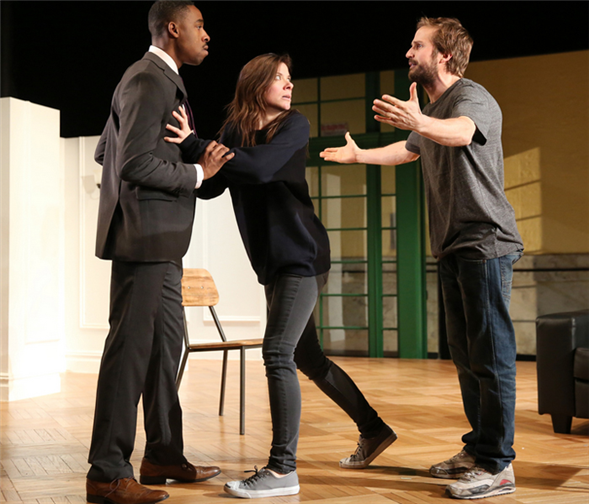Tracey Scott Wilson looks at gentrification from all sides
---
In Tracey Scott Wilson's
Buzzer, the days and weeks just slide together.
Take the first few minutes of the play, which is now at the Public Theater. In the opening scene, Jackson, a successful lawyer, talks to a real estate agent about the apartment he wants to buy in his old Brooklyn neighborhood, and by the time he explains himself, he's suddenly with his girlfriend Suzy, debating whether or not they should move in. A few seconds later, they actually own the place, and then before we know it, Jackson's friend Don has started crashing there.
This may be disorienting, but that's the point. After all, Jackson, who is African-American, and Don and Suzy, who are white, aren't just setting up a home. They're gentrifying a block. As Jackson recalls, it was horrible when he was young, full of crack and heroin, but now he and his friend and his girlfriend are riding an economic wave that's pushing out the "bad element."
That kind of change disrupts a community. It makes the hours work differently. Wilson knows this for a fact.
"Having been in gentrified neighborhoods and having gentrified neighborhoods myself, there's a constant tension," she says. "When I was recalling times that I lived in those [areas], I found myself not being able to remember things. Time has no meaning because you're so wrapped up in this tension and anger, and days conflate because all you can think about is that extreme emotion."
Wilson first tackled this experience a decade ago, when she mounted a short play about gentrification for New Jersey's McCarter Theater. That piece has essentially become
Buzzer's final scene, but since she first wrote it, America's economic disparity has gotten worse, giving her even more to consider.
For instance, she's seen Newark, New Jersey – where she was raised and where her mother still lives – become increasingly gentrified, and she's seen the ramifications. "There's an anger in the neighborhood I grew up in as it's changing," she says.
That frustration boils in the play, like when local boys make threatening comments to Suzy. Eventually, these encounters force all three main characters to confront their place in their new community. Is Jackson an insider because he's a black man who used to live nearby, or is he an outsider because he's wealthy now? Does Don have a connection to the old days because he used to buy drugs on the corner? Is Suzy being paranoid for not feeling safe?
{Image1}
Wilson, who's African-American and openly gay, candidly discusses facing similar issues of displacement when she and her girlfriend briefly lived in Brooklyn's Bed-Stuy area. "We were being looked at as interlopers by our own people," she says. "We were black, but we were not part of the neighborhood. We were not trusted."
On the other hand, the white people moving in didn't trust them either. Wilson recalls a morning when she and her partner tried to speak to a white woman walking on their street. "She got freaked out, ignored us, and did that fast walk away. We were two women walking a Dachshund! That was a profound moment for us."
The couple has since left Bed-Stuy and moved to an area of Brooklyn where they feel more easily at home. However, Wilson doesn't give her characters a similar escape plan. Instead, she increases the tension until everyone threatens to explode.
"I'm trying to demonstrate that this is where people live and how people live," she says. "I'm trying to understand the stress that comes with it."
---
Mark Blankenship is the editor-in-chief of TDF Stages
Top photo: Grantham Coleman, Tessa Ferrer, and Michael Stahl-David in Buzzer. Photo by Joan Marcus.
